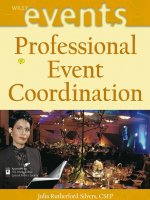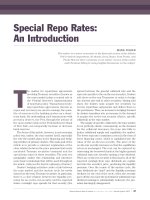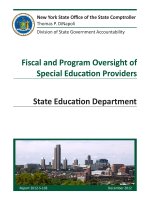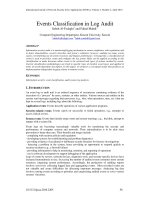Special events 7th ch06
Bạn đang xem bản rút gọn của tài liệu. Xem và tải ngay bản đầy đủ của tài liệu tại đây (1.16 MB, 30 trang )
Special Events, 7 Edition
th
Creating, Sustaining, and
Celebrating a New World
Professor Joe Goldblatt, FRSA
Chapter Six:
Vendor Partners, Contracts, and
Onsite Production
Copyright © 2014 by John Wiley & Sons, Inc. All rights
CHAPTER 6
AGENDA
Copyright © 2014 by John Wiley & Sons, Inc. All rights
Photo by the Author.
Agenda
1.
2.
3.
4.
5.
6.
7.
8.
9.
Animated introduction
Opening Activity:
Chapter Five Review
Chapter Six
Book Report Chapter Six
Mini case study discussion twelve
Global event thought leader Michael Loshin
Assignments
Questions, answers and discussion
Copyright © 2014 by John Wiley & Sons, Inc. All rights
Key Terms
•
•
•
•
•
Audio-visual: The sound, lighting and projection production
elements used in your event.
Catering: On premise (wherein a caterer has a permanent
presence in the event venue), off premise (wherein the caterer
transports food, beverage and their equipment to the venue)
and concession (wherein a caterer serves food and beverage
from specially designed catering vans, trucks or exhibit books
(stands) at your event.
Concessionaire: A food and beverage provider who is mobile
and serves from a truck, trailer or within a venue in a food and
beverage concession specified area.
Contract: A written agreement between two or more parties
specifying the obligations of each party in the production of the
special event.
ESTA: The electronic pre-authorization required for non-U.S.
citizens without official visas to enter the United States.
Copyright © 2014 by John Wiley & Sons, Inc. All rights
Key Terms (cont’d.)
•
•
•
•
•
•
License: A written approval to conduct the event provided by a
government or private organization. One of the typical licenses is
to be able to serve alcohol at your event. A more recent type of
license is one for the use of copyrighted recorded or live music
performed at your event.
Off-premise caterer: The firm or individual who generally
prepares the bulk of the food in one location and then delivers it to
a temporary location for the event.
On-premise caterer: The firm whose permanent catering kitchen
is in the same location as the facility hosting the event.
Permit: A written approval from a local jurisdiction or other
government or private organization that allows you to conduct the
event. One of the key permits is occupancy which specifies how
many persons may be allowed in the event venue at one time.
Production: The technical production elements such as sound,
lighting, projection and special effects that may be used in your
event.
Visa: The official
document issued by a government at their
Copyright © 2014 by John Wiley & Sons, Inc. All rights
Lecture Five Review
1. Understand basic event planning financial and accounting
terminology
2. Maintain event financial records
3. Understand and interpret the event balance sheet and income
statement
4. Calculate the break-even point and profit margin for your event
5. Forecast projected revenues and expenses for your event
6. Estimate reliable budget goals for your event
7. How to increase cash flow
8. Identify sustainable funding for your event
9. How to identify alternative funding for your event
10.Manage your event during turbulent economic times
11.Plan and allocate your event budget
Copyright © 2014 by John Wiley & Sons, Inc. All rights
Learning Objectives
1.
2.
3.
4.
5.
6.
7.
8.
9.
10.
11.
12.
13.
14.
15.
16.
Develop and implement the design for your event
Develop appropriate resources
Coordinate catering operations
Use trends in event catering
Coordinate technical resources, including lighting, sound, and special
effects
Conduct and analyze the site inspection
Develop and construct the production schedule
Anticipate and resolve operational conflicts
Recognize and comply with standard and customary event regulations
and procedures
Read, understand, and evaluate legal event documents
Access, plan, manage, and control potential event liabilities
Obtain necessary permits and licenses to operate events
Develop and manage risk management procedures
Understand and comply with environmental regulations governing events
Comply with regulations governing sponsorship of conferences and
meetings
Maintain documentary
evidence of compliance procedures
Copyright © 2014 by John Wiley & Sons, Inc. All rights
Activity: Who Are the
Vendor Partners in this Photo?
Copyright © 2014 by John Wiley & Sons, Inc. All rights
Photo by the Author.
Discussion
1. What types of vendor partners do
you normally recognize at events?
2. Where do you find your vendor
partners for each event?
3. How do you coordinate your vendor
partners for each event?
Copyright © 2014 by John Wiley & Sons, Inc. All rights
Discussion
1. Did you have any divergent opinions
within your group of stakeholders?
2. How did you overcome your
differences and reach consensus?
Copyright © 2014 by John Wiley & Sons, Inc. All rights
Develop and Implement the
Design for Your Event
1. Determine the needs, wants, and
desires of your guests.
2. Form follows function.
3. Engage proper vendor partners to
assist you with developing and
implementing the event design.
Copyright © 2014 by John Wiley & Sons, Inc. All rights
Develop Appropriate Resources
1. Resources may include vendor partners, staff,
volunteers, and other individuals and
organizations who may bring ideas and expert
execution to your event.
2. Contact the local convention and visitors bureau
or a professional events association for referrals of
appropriate resources.
3. Always seek references from clients who have
worked with the resources in the past. Make
certain the clients have produced events that are
similar in size and scope to the one you are
producing.
Copyright © 2014 by John Wiley & Sons, Inc. All rights
Coordinate Catering Operations
1. Location, location, location
2. On and off premise caterers
3. Styles and timings
Copyright © 2014 by John Wiley & Sons, Inc. All rights
Trends in Event Catering
1. Nutrition
2. Food and menu labelling
3. Smaller portions
Copyright © 2014 by John Wiley & Sons, Inc. All rights
Technical Resources: Lighting, Sound
and Special Effects
1.
2.
3.
4.
Why = What
LED versus incandescent lighting
Sound
Pyrotechnics
Copyright © 2014 by John Wiley & Sons, Inc. All rights
Conduct and Analyse the
Site Inspection
1. Identify the location(s) your guest will be travelling from
to attend the event.
2. Determine their individual and collective needs in terms
of accommodation, catering, leisure, and recreation.
3. Use services such as CVENT and MeetingMatrix to
identify appropriate venues for your event.
4. Create a site inspection checklist and visit the sites you
have identified as having met the criteria through their
response to your request for proposal.
5. When visiting the sites ask the representatives: “Is there
anything else I should know that will help my event be
more successful?”
Copyright © 2014 by John Wiley & Sons, Inc. All rights
Develop and Construct the
Production Schedule
1. The production schedule begins with
inspect the venue.
2. Each task on the production
schedule should be in a time
increment of 15 minutes or less.
3. List on the schedule the task, the
start and end time, who is
responsible, and any further notes
for the vendor partners.
Copyright © 2014 by John Wiley & Sons, Inc. All rights
Anticipate and Resolve
Operational Conflicts
1. Typical operational conflicts may include
disagreements about the set up of the
room, vendor partners disagreeing on
location or access to the venue, late
arriving vendor partners, and catering
service that may be off schedule.
2. To resolve these conflicts, anticipate
them in advance and prepare solutions
that may be executed by your staff.
Copyright © 2014 by John Wiley & Sons, Inc. All rights
Recognize and Comply with
Standard and Customary
Event Regulations and Procedures
1. For most events, you will require
permits and licenses. Research
these in advance and bring originals
and copies with you on site to the
event.
2. Some vendor partners will also be
required to have specific licenses
and permits. Request a copy of
these ten days in advance of the
event.
Copyright © 2014 by John Wiley & Sons, Inc. All rights
Read, Understand, and Evaluate
Legal Event Documents
1. You must be able to confirm that the
documents used for your event are
legally valid.
2. Engage a local attorney with
knowledge of the laws of your
jurisdiction to review key documents
in advance to insure they are legally
valid.
Copyright © 2014 by John Wiley & Sons, Inc. All rights
Access, Plan, Manage, and Control Potential Event
Liabilities
1.
2.
3.
4.
5.
Slips and falls
Theft
Fire
Alcohol
Crowding
Copyright © 2014 by John Wiley & Sons, Inc. All rights
Necessary Permits and Licenses to
Operate Events
1.
2.
3.
4.
5.
6.
Alcohol
Fire
Music
Noise
Occupancy
Street closure
Copyright © 2014 by John Wiley & Sons, Inc. All rights
Develop and Manage
Risk Management Procedures
1. Risk management begins with risk
assessment
2. Identify the frequency and severity
of all risks
3. Document your findings and assign
tasks to individuals to avoid, reduce,
or transfer risks
Copyright © 2014 by John Wiley & Sons, Inc. All rights
Understand and Comply with Environmental
Regulations Governing Events
1. Determine in advance all
environmental regulations regarding
your event (emissions, recycling,
waste removal, noise levels,
composting, etc.)
2. Comply with these regulations by
conducting an environmental audit
of your event and documenting all
actions.
Copyright © 2014 by John Wiley & Sons, Inc. All rights
Comply with Regulations Governing
Sponsorship of Conferences and Meetings
1. In the last decade, health care
organizations in the pharmaceutical
field have adopted strict regulations
regarding their sponsorship of
events.
2. Contact these health care
associations and insure that your
event’s request for sponsorship
conforms with these regulations.
Copyright © 2014 by John Wiley & Sons, Inc. All rights









